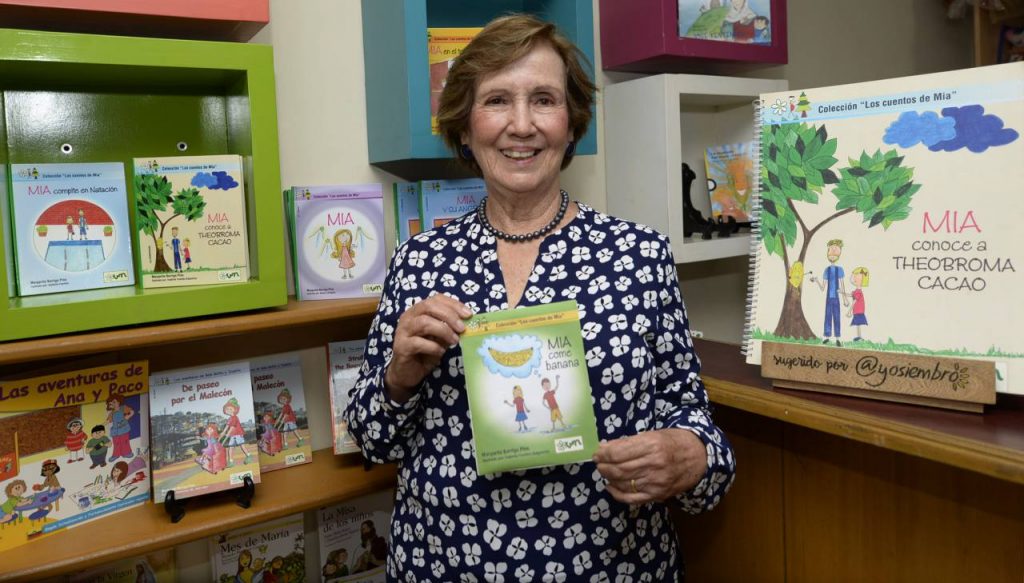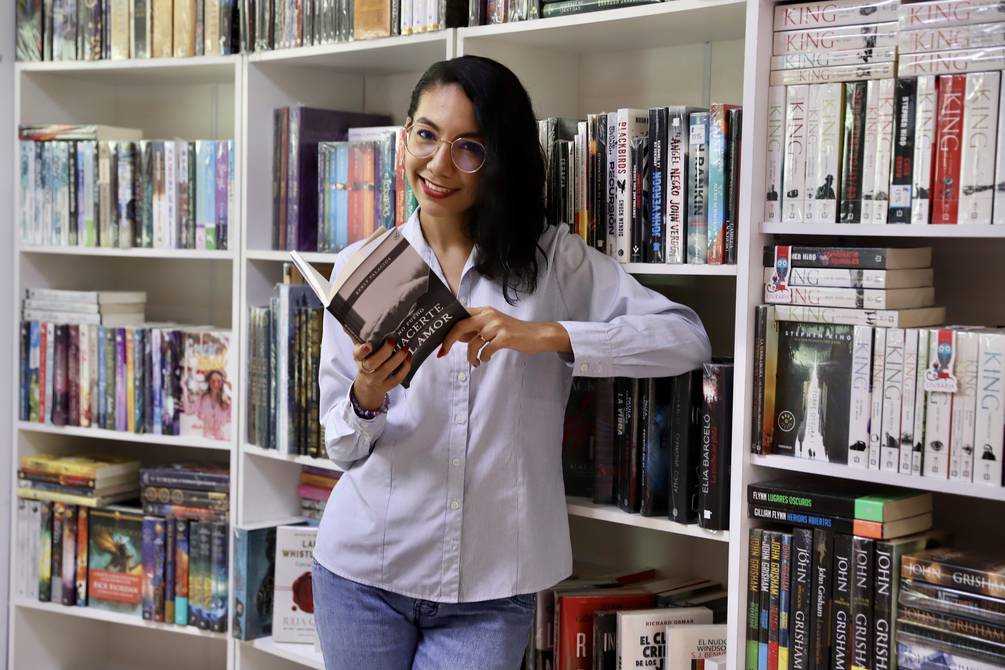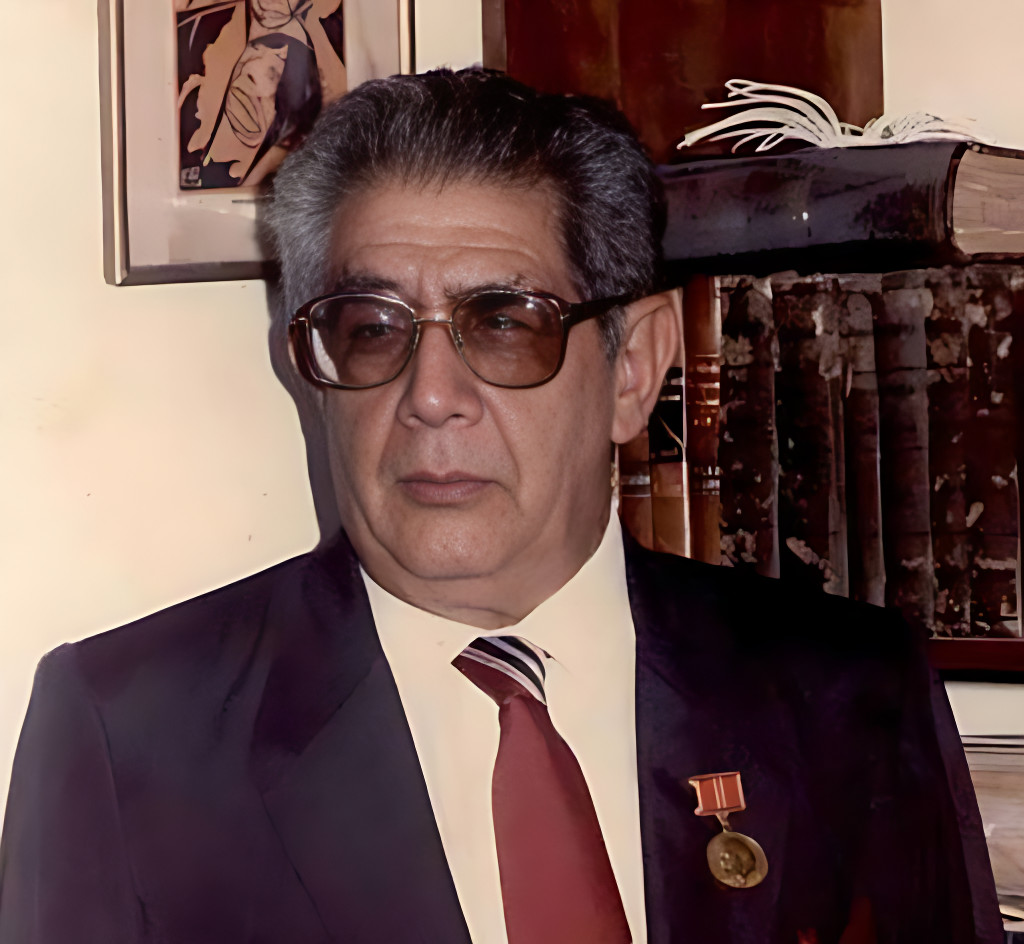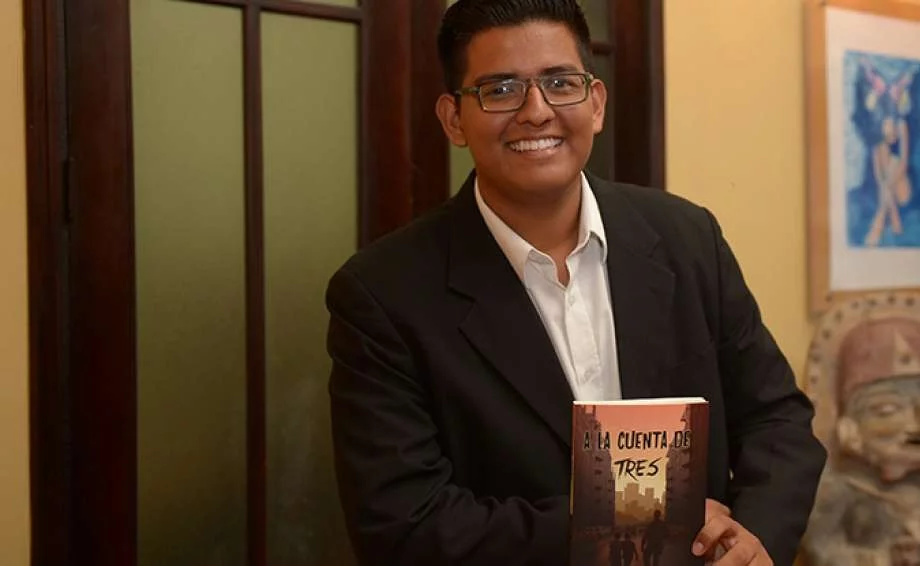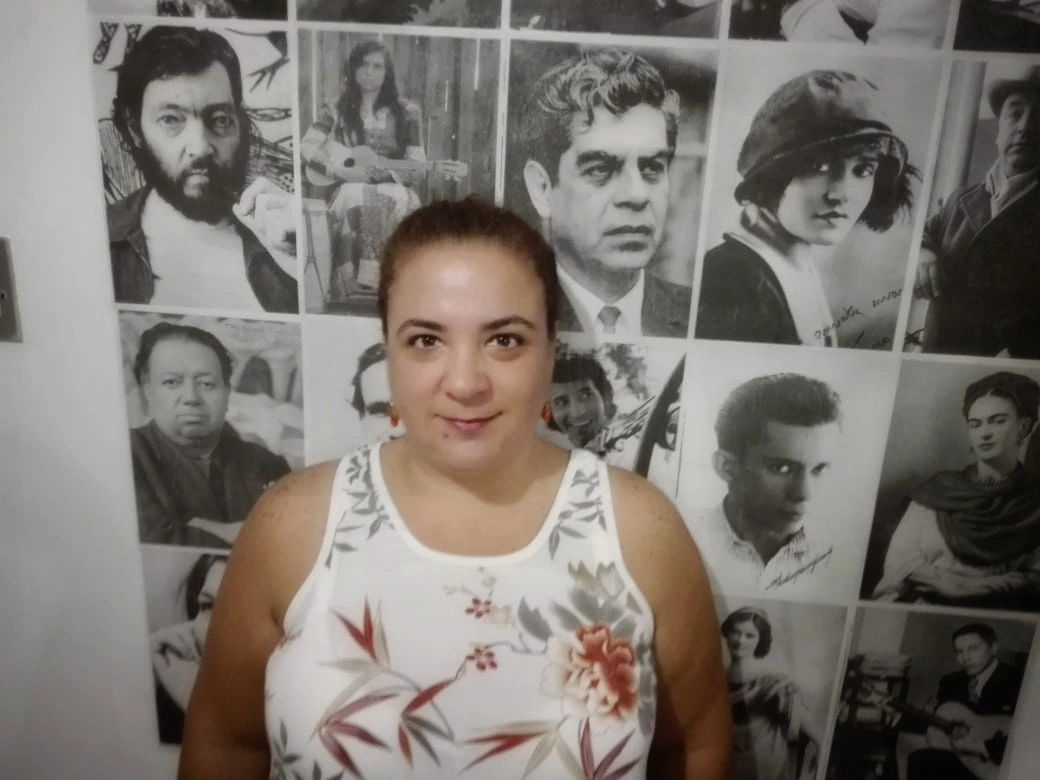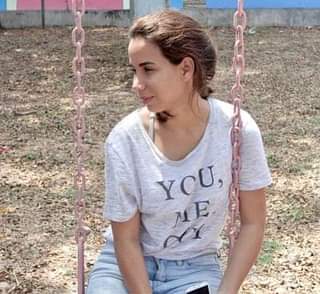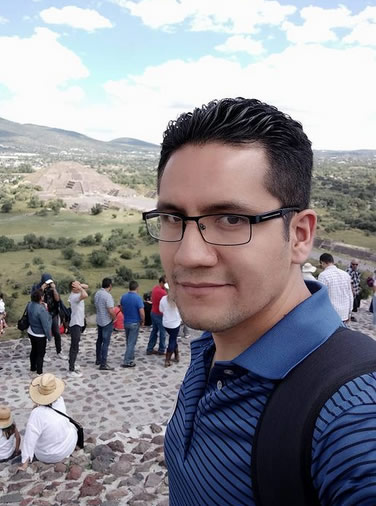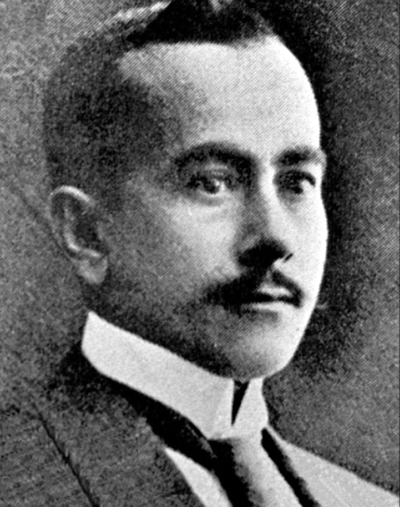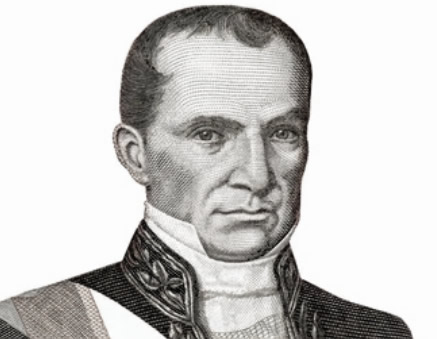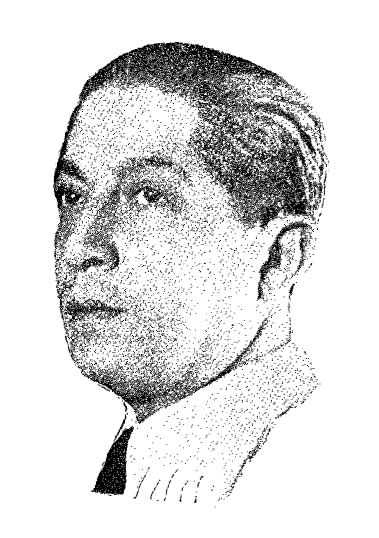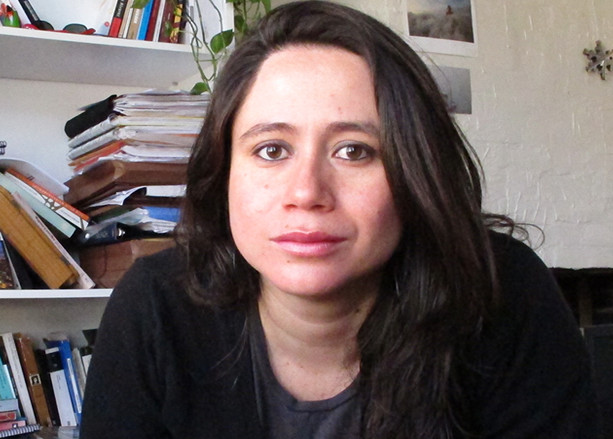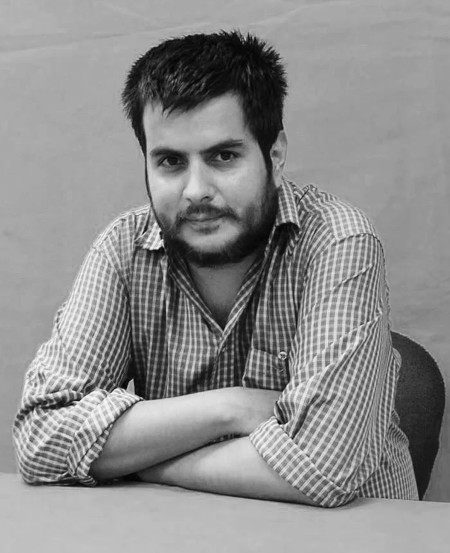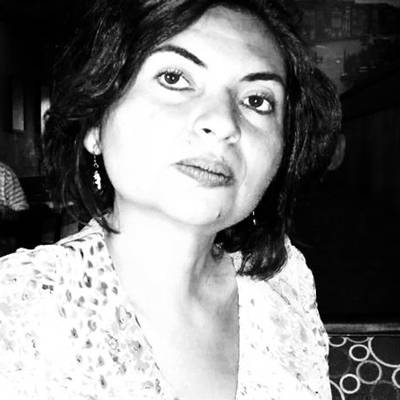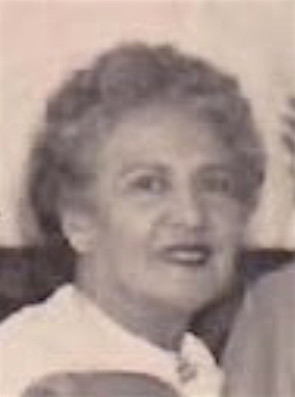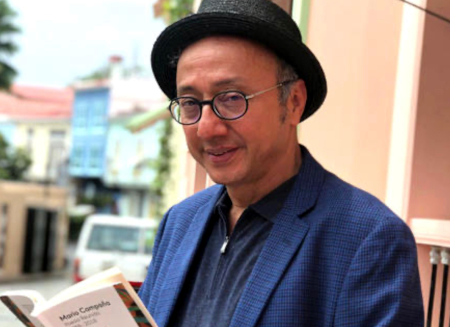Margarita Barriga Pino (Guayaquil, 1940) is an Ecuadorian children’s literature author. She is married to Armando Baquerizo, with whom she has eight children and twenty grandchildren. She took Theater and Pedagogy courses and was a teacher of Puppetry and Education at the Santiago de Guayaquil Catholic University for fifteen years. She has performed puppet theater and theater plays. She has owned a bookstore since 1985, where she teaches reading encouragement workshops for children and teachers.
Continue reading “Margarita Barriga”Category: Writers from Guayaquil
Kerly Palacios
Kerly Palacios Escobar (Guayaquil, 1994) is an Ecuadorian writer and poet. She has published two poetry collections, “El desvelo de mis versos” (2018) and “Secuelas” (2020). In 2021, she published her first novel, “No puedo hacerte el amor,” an erotic romance about a couple who cannot consummate their marriage. She claims to have written it in just four hours in December 2020, while character development and editing took another six months. She has taken part in the International Book Festival of Guayaquil.
Continue reading “Kerly Palacios”Elías Muñoz Vicuña
Elías Muñoz Vicuña (Yaguachi, Guayas, May 10, 1922 – Guayaquil, February 10, 1997) was an historian, writer, university professor, and member of the Ecuadorian Communist Party. His historical essays include: El 15 de Noviembre de 1922 (1978), Biografía de Olmedo (1980), and Papel Histórico de Vicente Rocafuerte (1983). In 1976 he was appointed professor of Economic, Social and Political History of Ecuador at the Faculty of Economics of the University of Guayaquil; in 1984 he was declared a member of the Institute of Labor Law; and in 1985 member of the Guayas chapter of the House of Ecuadorian Culture, and Visiting Professor of the Institute of Diplomacy of the University of Guayaquil. In 1983 he became a member of the National Academy of History. He traveled to many countries as a representative of the Ecuadorian Communist Party, including to Cuba in 1966 per the invitation of Fidel Castro; and in 1970 at the Centenary of Lenin’s birth in Ecuador, the Soviet Union awarded him with the “Lenin Gold Medal” in a public ceremony. Several educational institutions are named after him in Guayaquil.
Continue reading “Elías Muñoz Vicuña”Félix Villacís
Félix Abel Villacís del Valle (March 17, 2000) is an Ecuadorian novelist and poet. He has written four books. He worked as an editor for Editorial Déjà Vu and as the director of Editorial Madriguera from 2019 to 2021. His published books include “A la cuenta de tres” (2016), “La vida que me diste” (2018) and “Nudos” (2021). In 2020 he was a finalist of the eighth edition of “Día del libro y de la Rosa.”
Continue reading “Félix Villacís”María Paulina Briones
Mara Paulina Briones Layana (Guayaquil, 1974) is an Ecuadorian writer, editor, and professor. She currently teaches Journalism and Literature, as well as Journalistic Projects, at Casa Grande University and the University of the Arts (both in Guayaquil). She also runs the publishing company Cadaver Exquisito, which she founded in 2012, and has been the director of La Casa Morada, a cultural initiatives company that promotes reading, since 2009. She is featured in the bilingual poetry collection “Lengua me has vencido” (2017). Some of her stories have appeared in the Latin American Culture magazine Guaraguao, as well as the virtual magazines El Otro Lunes and Matavilela from Ecuador.
Continue reading “María Paulina Briones”Carlett Decker Santistevan
Carlett Miroslava Decker Santistevan (Guayaquil, 1996) is an Ecuadorian writer, screenwriter, filmmaker and director. She has a degree in Cinema from the University of the Arts with a mention in directing and screenwriting. Her short stories have been published in online magazines such as Letralia and Extrañas Noches.
Continue reading “Carlett Decker Santistevan”Jorge Tigrero Vaca
Jorge William Tigrero Vaca (Guayaquil, 1986) is an Ecuadorian poet, writer, journalist and university professor. He has published books of poetry, short stories and essays on pedagogy. He is a member of the Organization of Ibero-American States (OEI), an international governmental body for cooperation between Latin American countries in the field of education, science, technology and culture. He is also a member of the Global Network of Writers in Spanish (REMES). Tigrero works as a professor at the Casa Grande University, ECOTEC University and University of the Arts.
Continue reading “Jorge Tigrero Vaca”Carlos A. Rolando
Carlos Alberto Rolando Lobatón (Guayaquil, September 13, 1881 – Guayaquil, January 5, 1974) was an Ecuadorian doctor, writer, and renowned bibliographer. Known for his contributions to Ecuadorian literature and history, he opened his vast personal library to the public in 1913. Rolando was appointed director of the University of Guayaquil Library in 1925 and became a numerary member of the National Academy of History. In 1930, he founded the Guayaquil Historical Research Center and played a key role in preserving Ecuador’s cultural heritage. The National Authors Room at the Municipal Library of Guayaquil is named in his honor.
Continue reading “Carlos A. Rolando”Vicente Rocafuerte
Vicente Rocafuerte Bejarano (Guayaquil, May 1, 1783 – Lima, Peru, May 16, 1847) was an independence leader, statesman, diplomat, politician and writer. He was born into wealth and was educated in Spain. He returned to Ecuador in 1807 and was instrumental in freeing the country from Spain and, subsequently, from Gran Colombia. He served in the National Congress, as governor of Guayas Province, and as the second president of Ecuador (from 1834 to 1839). Rocafuerte’s writings on political systems, social reform, religious toleration, and economic development had significant influence on liberals in several Spanish American nations. Several schools and various awards are named after him, and many statues throughout Ecuador stand in his honor.
Continue reading “Vicente Rocafuerte”Carlos F. Granado Guarnizo
Carlos Francisco Granado Guarnizo (Guayaquil, 1890 – 1946) was an Ecuadorian poet, writer, playwright, literary critic and journalist. In 1913 he began publishing literary articles in the magazine El Telégrafo Literario under the pseudonym Lohengrim, and in 1914 in the newspaper El Cascabel under the pseudonym Antonio de Tarfes. In 1915 he began publishing poems in the magazine El Guante. That same year he wrote his poems, “Rotativa” and “Jesús,” which he donated to the Children’s Protection Society, which published them on their own account with a prologue by Nicolás Augusto González. In 1916 he founded the magazine Helios which he directed until its last issue in 1918. In 1917 he published his play Justicia, which Ricardo Descalzi described as one of Ecuador’s first works of social theater. A second edition of the play was published in 1939, the proceeds of which he donated to the Freemasons of Guayaquil. He had been a Freemason since 1919. His brother Miguel Ángel Granado Guarnizo was also a poet.
Continue reading “Carlos F. Granado Guarnizo”María Auxiliadora Balladares
María Auxiliadora Balladares Uquillas (Guayaquil, 1980) is an Ecuadorian writer, poet, and professor at Universidad San Francisco de Quito. She holds a Ph.D. in Latin American Literature from the University of Pittsburgh and has published widely in poetry, short stories, and essays. Her short story Jamón serrano won second place in the 10th Pablo Palacio Short Story Biennial, and her major works include Las vergüenzas (2013), Animal (2017), Guayaquil (2019), and Acantile duerme piloto (2022), which earned her the 2023 Jorge Carrera Andrade Award. Her writing often explores themes of identity, LGBTQI+ issues, and the natural world.
Continue reading “María Auxiliadora Balladares”Augusto Rodríguez
Augusto Rodríguez (Guayaquil, 1979) is an Ecuadorian poet, journalist, editor of El Quirófano Ediciones, university professor in Guayaquil and director of the Ileana Espinel Cedeño International Poetry Festival. He is the author of 20 books of poetry, short stories, novels, interviews and essays in prestigious publishing houses in Spain, Mexico, Cuba, Peru and Ecuador. His work has won numerous awards and is featured in various anthologies. He is one of the founders of the cultural group Buseta de Papel. He has participated in several literary events inside and outside of Ecuador. Part of his poetic work has been translated into twelve languages: English, Arabic, Portuguese, Catalan, Romanian, Italian, German, French, Chinese, Japanese, Serbian and Medumba.
Continue reading “Augusto Rodríguez”Ana Cecilia Blum
Ana Cecilia Blum (Guayaquil, March 17, 1972) is an Ecuadorian poet, essayist, fiction writer, editor, translator and journalist. She studied political and social sciences at the Vicente Rocafuerte Secular University in Guayaquil. She earned a postgraduate degree in “Teaching Spanish as a Foreign Language” from Colorado State University (U.S.). She is the founder and editor-in-chief of the digital magazine Metaforología which publishes poetry, fiction and essays. She currently lives between Ecuador and the United States. Some of her work has been translated into English, French, Italian and Portuguese.
Continue reading “Ana Cecilia Blum”Zaida Letty Castillo
Zaida Letty Castillo de Saavedra (Guayaquil, February 5, 1890 – Guayaquil, July 30, 1977) was an Ecuadorian poet. She hailed from a family of journalists and writers. She wrote under the pseudonym Djenana, which she adopted from a character in “Les Désenchantées,” a French novel by Pierre Loti. She published her works in “El Telegrafo Literario,” a literary supplement of the newspaper El Telégrafo, owned by her family. She also directed the supplement “La mujer y el Arte” of the Peruvian newspaper “El Comercio,” as well as other publications in Ecuador and Venezuela. She was a founder of the Guayas branch of the House of Ecuadorian Culture and her poetry appears in several anthologies of Latin American poetry.
Continue reading “Zaida Letty Castillo”Mario Campaña
Mario Campaña Avilés (Guayaquil, 1959) is an Ecuadorian poet, biographer, essayist and anthologist of poetry. He founded and directed the Latin American cultural magazine Guaraguao in Barcelona for 22 years, until 2018. In 2018 he published, “Poesía Reunida 1988-2018,” a compilation of all his published poems up to that time. He has also authored literary biographies on Francisco de Quevedo and Baudelaire. He has lived in Barcelona, Spain since 1992.
Continue reading “Mario Campaña”
